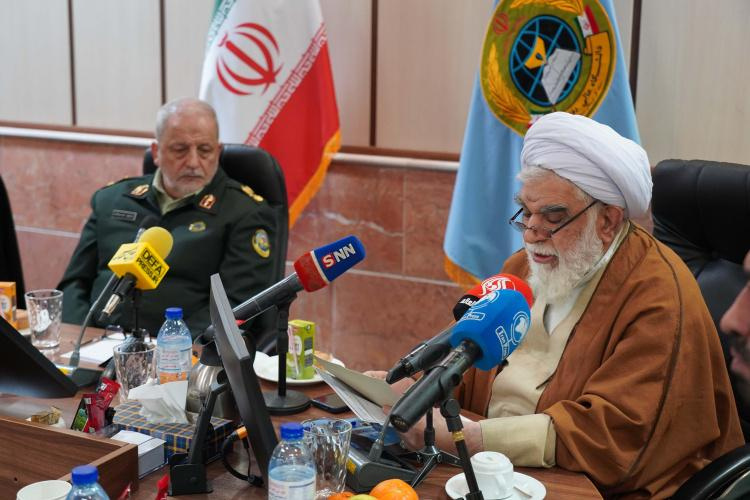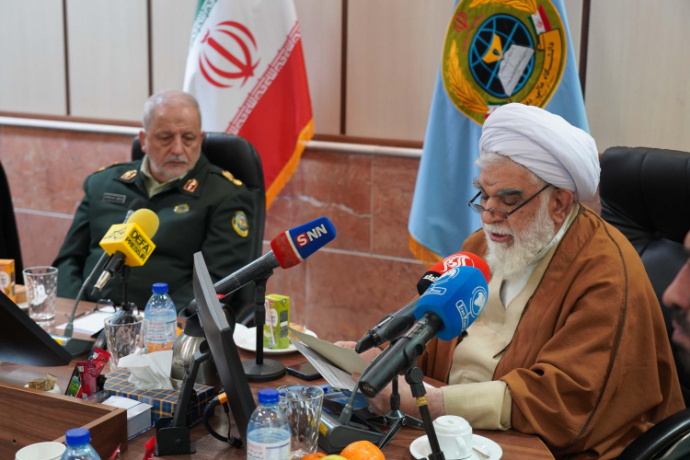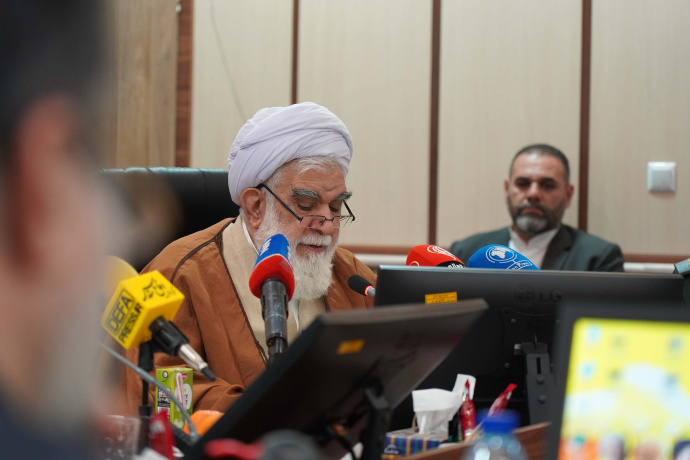Reading of the Message from the Secretary-General of the World Forum for Islamic Awakening at the Supreme National Defense University

According to the Center for Communications and International Relations, on Wednesday, January 1, 2025, scholars from 30 countries who were invited by the World Forum for Islamic Awakening arrived in the Islamic Republic of Iran and attended the Supreme National Defense University .In this session, Hojjatole-slam Akhtari, Head of the Committee for Supporting the Islamic Revolution of the Palestinian People, read a message issued by Dr. Ali Akbar Velayati, Secretary-General of the World Forum for Islamic Awakening. The text of this message is as follows:
In the Name of God, the Most Gracious, the Most Merciful.
The occurrence of the Islamic Revolution led by Imam Khomeini (may his soul rest in peace) in the late twentieth century and the emergence of a concept known as resistance is not merely a term; it is an ideology and theory that has influenced the fate of West Asia for years. In this context, the emergence and formation of the axis of resistance, led by His Excellency Ayatollah Khamenei (may his blessings be upon him), as an identity entity, an enlightening collection, and a regional identity-builder in the years following the victory of the Islamic Revolution, is a phenomenon that has altered many regional and international relations.Although throughout the twentieth century, many subnational and transnational actors protested against the prevailing rules and norms governing international relations and undertook significant actions to counter and change these rules, tangible results were not achieved. In such a situation, the Islamic Revolution in Iran triumphed, challenging the bipolar and unipolar system and leaving profound impacts on the international order.
The movement that challenged the East and West blocs and led a significant religious uprising demonstrated the obsolescence of stereotypes, introducing religion and the secular world together as a new methodology, thus marking the beginning of a new era.However, the dawn of the twenty-first century, evidenced by various signs, indicates the decline of U.S. hegemony and the emergence of new regional and global powers. Current events and trends reveal that the global order is changing, and one indication of this is the significant increase in actors within the international system opposing existing rules, norms, and powers.The formation of the axis of resistance as a defensive and security entity in West Asia and the establishment of the geopolitics of resistance have been major achievements of the Islamic movement in recent years.
The United States, which has consistently acted to maintain its dominance and avoid decline through the dual strategy of threat and appeasement, has seen many movements and groups rise over the past century in opposition to unilateralism, from Central America to Southeast Asia, in an effort to divert or suppress them. Over the last half-century, it has also supported the illegitimate Zionist regime unconditionally and without limits to preserve its hegemony against the axis of resistance, to enhance influence, and to sustain colonialism and exploitation, attempting to prevent the formation and empowerment of the axis of resistance. However, one of the fundamental and most important factors of the resistance discourse, which has always been emphasized, has been the struggle against Israel and support for the Palestinian cause in the region.
In fact, the issue of Palestine, along with opposition to Israel, is one of the common and enduring determining factors for resistance groups regarding the existing order. Since the primary objective of the hegemonic powers in the region has been to ensure the security of Israel, the liberation of Al-Quds (Jerusalem) has been established as one of the fundamental demands of resistance in the region. This essential principle was able to redirect the Arab world away from normalizing relations with Israel, which had been initiated by the signing of the Camp David Accords by Anwar Sadat, the then-President of Egypt, in the early days following the victory of the Islamic Revolution. Such a policy opened new avenues in the struggle against Israel.
The establishment of revolutionary and popular resistance movements against Israeli domination, prominently including Hezbollah in Lebanon, Hamas, and the Islamic Jihad Movement in Palestine, as well as the initiation of the Intifada in the occupied territories, has all been realized in light of the model of the Islamic Revolution and its Ummah(nation)-centered perspective, along with the guiding influence of the Leader of the Islamic Revolution. Today, we witness intense popular hatred and unprecedented events occurring worldwide and within international forums against this regime, all of which are the fruits of resistance and the operations of October 7.
The emergence of waves of Intifada, the inspiration of the Islamic Revolution, the expulsion of the Zionist regime from southern Lebanon, the 33-day war with Hezbollah, and the 22-day, 8-day, and 42-day conflicts in Gaza, alongside the adoption of a smart defensive doctrine in Iraq and Yemen, as well as the conviction and belief of Palestinian youth in the face of the nefarious plans and scenarios of imperialism—such as the preparations for and the so-called "Deal of the Century"—are evidence that, in their latest and most significant initiative, they designed and executed the "Al-Aqsa Flood," delivering a strategic blow to the identity and structure of imperialism and the system of oppression. They demonstrated to the world that the beginning of change in the region and the new Middle East is marked by October 7 and the successful operations of the Al-Aqsa Flood, rather than the will of the United States and the infamous Prime Minister of the Zionist regime.
The occupying regime of Al-Quds and its international supporters, in their misguided belief following this disastrous defeat, think that by exerting pressure on our resilient and patient Palestinian nation and through the crimes and genocide committed in the region, including the recent situation in Syria, they can force the people of Gaza and other countries into involuntary displacement and eliminate Islamic resistance. However, according to divine traditions, the more pressure, oppression, and aggression are inflicted upon the resilient Palestinian nation, the more counterproductive the results will be. The outcome of the resistance and resilience of the heroic Palestinian people will soon reveal fruitful effects and results in Syria and other parts of the world, demonstrating how the logic of Islamic resistance has changed the rules of the game, showcasing the blossoms and fruits of this commendable resistance, which embodies dignity, honor, and the triumph of an epic struggle.
— Ali Akbar Velayati, Secretary-General of the World Forum for Islamic Awakening







Your Comment :